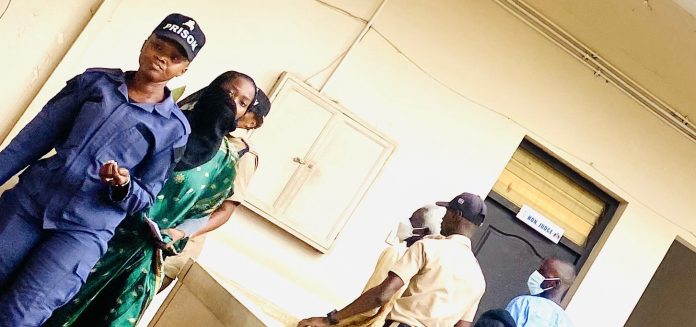By Mariama Marong
A police investigator on Tuesday told the High Court in Banjul that victims of human trafficking were forced to pay large sums of money to a woman they knew only as “Diamond,” now identified as Hanna Magbujor Isaiah, the accused in a high-profile trafficking case.
Prosecutors alleged that Ms. Isaiah operated a trafficking ring that exploited young women under the guise of romantic or economic opportunity.
Testifying before Justice Sidi K. Jobarteh, State witness Seedy Bojang, a police investigator, submitted two key pieces of evidence — a cautionary statement signed by the accused and a handwritten ledger containing names, months, and detailed financial records. The documents were admitted by the court as Exhibits PA and PB, respectively, without objection from the defense.
“The accused told me during our interaction that she is also called Diamond,” said Mr. Bojang. “The book shows the names of victims and records of payments made to her. Some entries clearly indicate that victims were required to pay 300,000 dalasis.”
The evidence emerged during the cross-examination phase of the trial, in which Hanna Magbujor Isaiah, also known as Treasure, is facing six serious charges including trafficking in persons, importation for the purpose of prostitution, and other related felonies.
The case stems from complaints by multiple women, including one victim who testified on July 2 that she was lured to The Gambia under false promises of an iPhone 15 and a relationship with a “Whiteman.” Upon arrival, she said, she was held and forced into prostitution by Hanna and another individual referred to only as “Karamel.”
Under examination by State Counsel M. Drammeh, Mr. Bojang described how he was tasked by a senior officer to obtain the accused’s cautionary and voluntary statements. “I read the statement back to her, and she confirmed and signed it,” he told the court.
In addition to the statement, the officer found a notebook during his investigation that detailed transactions tied to victims of the alleged trafficking operation. He said the names, dates, and amounts appeared to be consistent with forced repayment schemes imposed on trafficked women.
Defense lawyer H. Gaye sought to challenge the implication of the records, suggesting that the payments could have been related to food or accommodation. But the witness stood firm. “If they were payments for food or personal expenses, that would have been indicated,” he said. “This was clearly a record of money collected from victims.”
Ms. Gaye pressed further, questioning whether Mr. Bojang had gone beyond the victim testimonies in his investigation. He admitted he had not visited the accused’s residence and had only followed the instructions of his superiors.
“My mandate was to investigate the trafficking allegations. I did not conduct a full-scale investigation outside that scope,” he said, acknowledging that he did not examine other aspects of the accused’s life or business dealings.
Asked whether his findings were based solely on the victim statements, Mr. Bojang responded that his task was to obtain the relevant documents and submit the case file to the prosecution. “I did what I was directed to do,” he told the court.
If convicted, Isaiah faces multiple felony charges under Gambian law, each carrying significant prison terms.
The case was adjourned to July 15, 2025, at 12:30 p.m. for continuation.
















